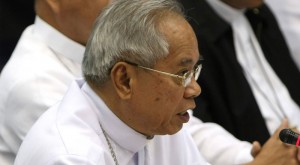MANILA, Philippines–Amid growing resistance to the proposed Bangsamoro Basic Law (BBL) due to the Mamasapano tragedy, Cotabato Archbishop Orlando Cardinal Quevedo urged Filipinos, especially Christians, to reject biases and prejudices toward Muslims—including the Moro Islamic Liberation Front (MILF)—in order to appreciate the overall constitutional principle that governs the measure.
In a letter addressed to all Christians, Quevedo stressed the constitutionality of the proposed BBL, which, he added, was even inspired by Catholic moral principles and Christian values.
“I have witnessed a harmonious dialogue of life among the students. Many of our soldiers and high-ranking officers studied in our Catholic schools. So, too, did members and leaders of the MILF. They are not terrorists. Terrorists have in fact broken away from them,” he said.
Public anger over the Mamasapano tragedy has prompted Congress to suspend deliberations over the proposed BBL, with some saying that justice must be served first to the victims before the measure is passed into law.
Biases, prejudices
Quevedo called on lawmakers and Christians against letting emotions, biases and prejudices to prevail over objective reason so that the Mamasapano incident will not repeat itself.
“In the face of outrage and calls for an all-out war for the manner by which our law enforcers lost their lives, I call for peace. I call for rationality rather than emotionalism. I call for justice that is not selective. I call for openness and fairness rather than bias and prejudice,” he said.
“The BBL was negotiated painstakingly with stops and detours for at least five years. It is not an agreement that was hurriedly done. It fulfills the Bangsamoro aspiration for self-determination. It preserves our fundamental principles of national sovereignty and territorial integrity,” Quevedo said.
“The MILF only aspires and struggles politically for a place under the sun in freedom and dignity,” he added.
According to him, “our age-old Christian biases and prejudices against Moros have quickly and most sadly resurrected” in the wake of the Mamasapano incident.
Bottom line: Mistrust
“Biases and prejudices have colored and clouded our judgment,” Quevedo said, explaining that these had produced “totally wrong” convictions.
“We hear ourselves say, we cannot trust the Moros. We cannot trust the MILF. We cannot trust them to lay down their arms, we cannot trust them with the money they need for development, we cannot trust them to go after terrorists once they have their own government, we cannot trust them to practice democracy, we cannot trust them to govern well. We simply cannot trust them,” he said.
“The bottom line of the Mamasapano tragedy is mistrust—on both sides of the conflict,” said the prelate, who has served for more than three decades as a priest in Mindanao.
Quevedo noted that all Moro armed groups were being lumped together “as lawless groups that advocate secession and independence.” These groups include the MILF, the Moro National Liberation Front, the Bangsamoro Islamic Freedom Fighters, the Abu Sayyaf and private armed groups.
Wrong conclusions
He listed other “totally wrong” conclusions:
We believe that the MILF claims the whole of Mindanao.
We conclude that the Bangsamoro government will have agencies that will be totally independent of their national counterparts.
We assert that the MILF will become the police force of the Bangsamoro.
We dismiss as sham the conversion of MILF from a secessionist movement into a principled partner for peace. We persist in calling them “secessionists.”
We threaten to do away with provisions that protect a proposed fledgling Bangsamoro government from the negativities of warlordism and clan domination. Yet it is so easy to ask our own peace negotiators why it is necessary for the Bangsamoro to be “MILF-led” in the short term.
We mistrust the MILF’s determination to govern well and thus to reverse Bangsamoro political history.
Subsidiarity
On the contrary, Quevedo argued that under the BBL, Bangsamoro self-determination would be exercised within a limited territory under the sovereignty of the Philippines. Hence, national sovereignty and territorial integrity [still] will be preserved, contrary to the qualms of critics.
“The overall principle that governs the BBL is the Catholic moral and social principle of subsidiarity, a principle already enshrined in our own Constitution,” he stressed.
“The principle requires the intervention of the national government and its various entities when the common good of all requires it. Therefore, no entity of the Bangsamoro government, such as a Bangsamoro auditing department or police force, is absolutely independent of their national counterparts.”
Speaker Feliciano Belmonte Jr. has allowed the ad hoc committee on the proposed BBL to hold hearings even during the recess to meet the June 30 target of passing the controversial measure.
He said he gave the go signal to the panel chair, Cagayan de Oro Rep. Rufus Rodriguez, on Monday after the Philippine National Police postponed the release of the board of inquiry report on the Jan. 25 Mamasapano debacle.
Congress adjourns on March 18 and will resume sessions on May 4. With a report from DJ Yap
